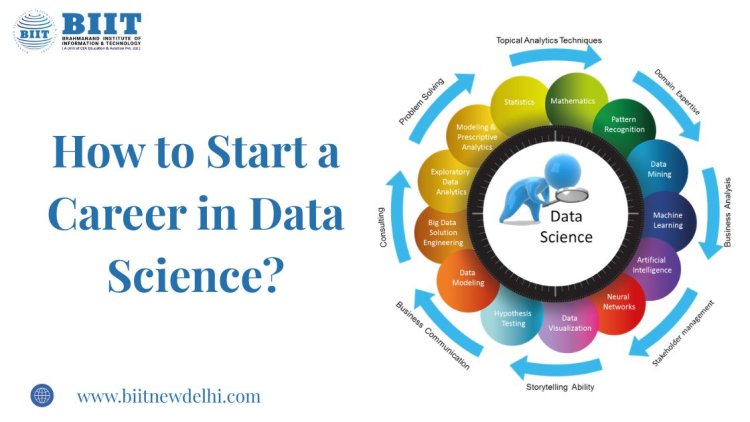How to Start a Career in Data Science?
Whether you're a student exploring career paths or a professional considering a career change, data science is an exciting and rewarding choice. In this article, we’ll explore what data science is, the skills required to enter the field, and how to embark on this career path.
Share this Post to earn Money ( Upto ₹100 per 1000 Views )

Today, data science has become one of the most sought-after career options. From tech companies to healthcare, finance, and beyond, organizations across industries harness data's power to drive their decisions. The demand for skilled data scientists is at an all-time high, creating numerous opportunities for professionals in this field.
Whether you're a student exploring career paths or a professional considering a career change, data science is an exciting and rewarding choice. In this article, we’ll explore what data science is, the skills required to enter the field, and how to embark on this career path.
What is Data Science?
Data science is the process of building, cleaning, and structuring datasets to analyze and extract meaning. It’s not to be confused with data analytics, which is the act of analyzing and interpreting data. These processes share many similarities and are both valuable in the workplace.
Data science requires you to:
-
Form hypotheses
-
Run experiments to gather data
-
Assess data’s quality
-
Clean and streamline datasets
-
Organize and structure data for analysis
Data scientists often write algorithms—in coding languages like SQL and R—to collect and analyze big data. When designed correctly and tested thoroughly, algorithms can catch information or trends that humans miss. They can also significantly speed up the processes of gathering and analyzing data.
Core Skills in Data Science
Are you looking to make a career change to become a data scientist? This skill path is focused on helping existing data professionals, such as data analysts and data engineers, learn the core skills and knowledge necessary to become data scientists.
Core Skills
-
Programming:
-
Proficiency in languages like Python and R is crucial for data manipulation, analysis, and building.
-
Statistics and Probability:
-
A strong understanding of statistical concepts and probability theory is essential for interpreting data and making predictions.
-
Machine Learning:
-
Knowledge of various machine learning algorithms and techniques is vital for building predictive models and extracting insights from data.
-
Data Visualization:
-
The ability to effectively visualize data using tools like Tableau, Power BI, Matplotlib, and Seaborn is crucial for communicating findings and identifying patterns.
-
Data Wrangling and Database Management:
-
Skills in cleaning, transforming, and managing data from various sources, including databases, are essential for data preparation.
-
Big Data:
-
Understanding how to work with large datasets and tools for processing them, such as Hadoop and Spark, is increasingly important.
-
Cloud Computing:
Familiarity with cloud platforms like AWS, Azure, or GCP can be beneficial for deploying models and managing data infrastructure. -
SQL:
-
Knowledge of SQL is important for interacting with relational databases.
Soft Skills:
-
Communication:
The ability to clearly and concisely explain complex data findings to both technical and non-technical audiences is essential. -
Problem-Solving:
Data scientists need to be able to identify problems, develop solutions, and critically evaluate results. -
Critical Thinking:
Analyzing data objectively, identifying patterns, and drawing meaningful conclusions require strong critical thinking skills. -
Business Acumen:
Understanding the business context and how data can be used to drive decision-making is important.
Curiosity and Intellectual Honesty:
A data scientist should be curious about data and have a strong sense of intellectual honesty when interpreting results.
How to Start a Career in Data Science?
Educational Requirements
While a formal degree can be helpful, it is not always necessary to break into data science. A degree in computer science, statistics, or engineering provides a strong foundation, but the most important aspect is learning and applying relevant skills.
Traditional Route
A Bachelor's degree in a relevant field (such as computer science, mathematics, or economics) followed by a Master's in Data Science or a similar program will provide you with the theoretical knowledge and practical skills needed.
Non-traditional Route
If you're looking to transition into data science without a formal degree, boot camps and online courses can be an excellent alternative. Platforms like Coursera, edX, and Udacity offer courses in data science that range from beginner to advanced levels. These can be a cost-effective way to acquire new skills in a relatively short period.
Key Skills You Need to Learn
-
Mathematics and Statistics
-
A strong understanding of probability, calculus, and linear algebra is crucial. These areas help you understand how algorithms work and how to assess the performance of models.
-
Programming
-
Learn Python and R. These programming languages are the most widely used in the field due to their vast libraries and flexibility. Additionally, SQL is essential for querying databases.
-
Data Wrangling and Preprocessing
-
A large part of data science involves preparing raw data for analysis. This includes handling missing values, normalizing data, and transforming it into a useful format for modeling.
-
Machine Learning
-
Machine learning is one of the most sought-after skills. Familiarize yourself with algorithms such as linear regression, logistic regression, decision trees, and neural networks.
-
Data Visualization
-
Tools like Tableau, PowerBI or Python libraries like Matplotlib and Seaborn can help you communicate insights visually.
Steps to Follow for Entering the Field
-
Learn the Basics of Data Science – Start with introductory courses and resources to grasp the foundational concepts.
-
Focus on Programming – Practice coding regularly, starting with Python and SQL.
-
Work on Projects – Build a portfolio by working on real-life projects. This will not only solidify your learning but also give you something tangible to showcase to potential employers.
-
Pursue Internships or Freelance Projects – Hands-on experience is invaluable. Look for internships, freelance gigs, or volunteer projects that allow you to apply your skills in a real-world setting.
-
Stay Updated – Data science is an evolving field. Stay current with new trends, tools, and techniques through continuous learning.
What Are the Career Opportunities in Data Science?
Data science is a broad field with a range of roles. Here are some of the common job titles:
-
Data Scientist – Focuses on analyzing data, building predictive models, and creating algorithms.
-
Data Analyst – Responsible for gathering, processing, and interpreting data to help make business decisions.
-
Machine Learning Engineer – Works on the design and implementation of machine learning models.
-
Data Engineer – Focuses on designing and maintaining data pipelines and architectures.
-
Business Intelligence Analyst – Uses data to help organizations make strategic business decisions.
Career Progression in Data Science
Data science offers an excellent growth trajectory. Here’s an example of how your career might progress:
-
Junior Data Scientist/Analyst – Early career, typically focusing on data cleaning, analysis, and simple modeling.
-
Data Scientist – Involved in more complex models, machine learning, and data-driven strategies.
-
Senior Data Scientist – Leads teams, mentors juniors, and works on high-level strategy and implementation.
-
Data Science Manager/Lead – Oversees data science projects and teams, focusing on scaling and integrating data science solutions.
-
Chief Data Officer (CDO) – Executive role responsible for the overall data strategy within an organization.
Challenges in Data Science
While the field is promising, it is not without its challenges.
1. The Data Deluge: One of the biggest challenges in data science is dealing with large amounts of data.
Solution: Prioritize and Cleanse: To meet this challenge, focus only on the data that is relevant to you and collect only information that directly matches your objectives.
2. Lack of Quality Data: It’s good to collect a lot of information for your company, but it’s also important for the data to be useful.
Solution: Conduct Data Audits: Regularly conduct data audits to ensure the quality of your information. Implement validation checks and address any inconsistencies
3. Lack of proper communication between data scientists and stakeholders
Data scientists speak the language of data algorithms and data analytics, whereas stakeholders often talk in terms of the organization.
Solution: Develop Data Storytelling Skills: Data storytelling skills involve presenting complex data in an engaging and narrative form. So that this complex data can be easily understood even by non-technical stakeholders.
4. Choose the Right Technologies and Tools
You get to see many tools and technologies in this field of data science. It can be difficult to choose the right tools and technology for your project from these many tools and technologies.
Solution: Start Simple and Learn: To tackle this problem, start with the basics. Familiarize yourself with commonly used tools like Python and R.
5. Ensuring Data Security and Privacy
Along with better data for the company, a data scientist also has a big responsibility.
Solution: Implement Robust Security Measures: Employ encryption techniques to protect data during transmission and storage. Regularly update your security protocols to stay ahead of potential threats.
6. Scaling Analytics for Big Data
As a company grows, the amount of data it generates also increases. Scaling up analytics to handle big data efficiently can be a daunting task.
Solution: Embrace Cloud Computing: Cloud computing platforms provide scalable and flexible solutions for handling this type of big data.
People Also Ask
What qualifications do I need to work in data science?
You typically need a background in mathematics, statistics, computer science, or engineering. A degree in one of these fields can be helpful, but it’s possible to enter the field through boot camps and self-learning.
Is a degree necessary for a career in data science?
While a degree can provide a strong foundation, it is not strictly necessary. Many data scientists have successfully transitioned into the field through self-taught skills, boot camps, and online courses.
What are the best programming languages for data science?
Python is the most popular language, followed by R and SQL. Python’s extensive libraries (such as Pandas, NumPy, and Scikit-learn) make it ideal for data manipulation and machine learning.
How can I switch to a career in data science?
To switch to data science, start by acquiring the necessary skills (e.g., programming, statistics, and machine learning). Work on projects, build a portfolio, and consider internships or entry-level roles to gain hands-on experience.
What is the future of data science?
The future of data science looks promising. With the rise of artificial intelligence and machine learning, the demand for data scientists is expected to continue growing across various industries.
Conclusion
A career in data science offers numerous opportunities for those who are passionate about solving complex problems through data. The field continues to expand, with organizations constantly seeking skilled professionals to help them unlock the value hidden in their data.
To start your career in data science, focus on developing the right skills, building a portfolio of projects, and gaining real-world experience. Whether you follow a traditional or non-traditional route, the journey to becoming a data scientist can be both rewarding and impactful.
This comprehensive guide serves as a stepping stone toward your journey in the exciting world of data science. Whether you're just starting or looking to upskill, there's a path for everyone in this dynamic field.














